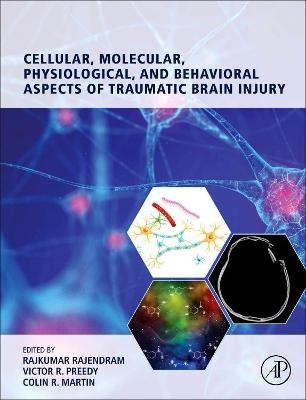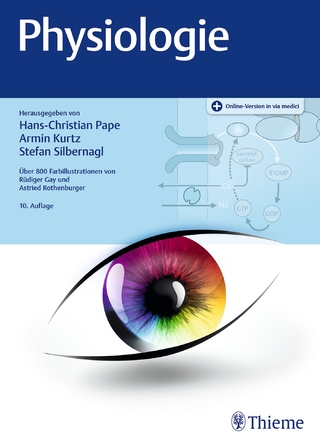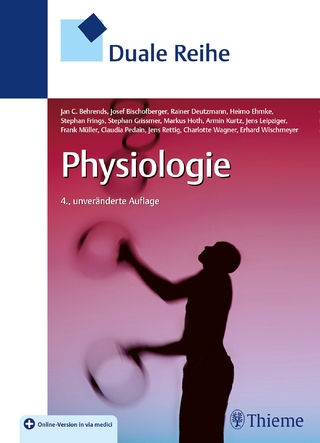
Cellular, Molecular, Physiological, and Behavioral Aspects of Traumatic Brain Injury
Academic Press Inc (Verlag)
978-0-12-823036-7 (ISBN)
Dr Rajkumar Rajendram is a clinician scientist with a focus on internal medicine, anaesthesia, intensive care and peri-operative medicine. He graduated with distinctions from Guy’s, King’s and St. Thomas Medical School, King’s College London in 2001. As an undergraduate he was awarded several prizes, merits and distinctions in pre-clinical and clinical subjects. Dr Rajendram began his post-graduate medical training in general medicine and intensive care in Oxford. He attained membership of the Royal College of Physicians (MRCP) in 2004 and completed specialist training in acute and general medicine in Oxford in 2010. Dr Rajendram subsequently practiced as a Consultant in Acute General Medicine at the John Radcliffe Hospital, Oxford. Dr Rajendram also trained in anaesthesia and intensive care in London and was awarded a fellowship of the Royal College of Anaesthetists (FRCA) in 2009. He completed advanced training in regional anaesthesia and intensive care. He was awarded a fellowship of the Faculty of Intensive Care Medicine (FFICM) in 2013 and obtained the European diploma of intensive care medicine (EDIC) in 2014. He then moved to the Royal Free London Hospitals as a Consultant in Intensive Care, Anaesthesia and Peri-operative Medicine. He has been a fellow of the Royal College of Physicians of Edinburgh (FRCP Edin) and the Royal College of Physicians of London (FRCP Lond) since 2017 and 2019 respectively. He is currently a Consultant in Internal Medicine at King Abdulaziz Medical City, National Guard Heath Affairs, Riyadh, Saudi Arabia. Dr Rajendram’s focus on improving outcomes from Coronavirus Disease 2019 (COVID-19) has involved research on point of care ultrasound and phenotypes of COVID-19. Dr Rajendram also recognises that nutritional support is a fundamental aspect of medical care. This is particularly important for patients with COVID-19. As a clinician scientist he has therefore devoted significant time and effort into nutritional science research and education. He is an affiliated member of the Nutritional Sciences Research Division of King’s College London and has published over 400 textbook chapters, review articles, peer-reviewed papers and abstracts. Victor R. Preedy BSc, PhD, DSc, FRSB, FRSPH, FRSC, FRCPath graduated with an Honours Degree in Biology and Physiology with Pharmacology. After gaining his University of London PhD, he received his Membership of the Royal College of Pathologists. He was later awarded his second doctorate (DSc), for his contribution to protein metabolism in health and disease. He is Professor of Clinical Biochemistry (Hon) at King’s College Hospital and Emeritus Professor of Nutritional Biochemistry at King’s College London. He has Honorary Professorships at the University of Hull, and the University of Suffolk. Professor Preedy was the Founding Director and then long-term Director of the Genomics Centre at King’s College London from 2006 to 2020. Professor Preedy has been awarded fellowships of the Royal Society of Biology, the Royal College of Pathologists, the Royal Society for the Promotion of Health, the Royal Institute of Public Health, the Royal Society for Public Health, the Royal Society of Chemistry and the Royal Society of Medicine. He carried out research when attached to the National Heart Hospital (part of Imperial College London), The School of Pharmacy (now part of University College London) and the MRC Centre at Northwick Park Hospital. He has collaborated with international research groups in Finland, Japan, Australia, USA, and Germany. To his credit, Professor Preedy has published over 750 articles, which includes peer-reviewed manuscripts based on original research, abstracts and symposium presentations, reviews and edited books. Colin R. Martin RN, BSc, MSc, PhD, MBA, YCAP, FHEA, C.Psychol, AFBPsS, C.Sci is Professor of Clinical Psychobiology and Applied Psychoneuroimmunology and Clinical Director of the Institute of Health and Wellbeing at the University of Suffolk, UK. He is a Chartered Health Psychologist and a Chartered Scientist. He also trained in analytical biochemistry, this aspect reflecting the psychobiological focus of much of his research within mental health. He has published or has in press well over 300 research papers and book chapters. He is a keen book author and editor having written and/or edited more than 50 books. These outputs include the prophetic insight into the treatment of neurological disease, Handbook of Behavior, Food and Nutrition (2011), Nanomedicine and the Nervous System (2012), Oxidative Stress and Dietary Antioxidants in Neurological Disease (2020), Zika Virus Impact, Diagnosis, Control and Models (2021), Factors Affecting Neurodevelopment: Genetics, Neurology, Behavior and Diet (2021), Diagnosis and Treatment of Spinal Cord Injury (2022), The Neurobiology, Physiology, and Psychology of Pain (2022) and The Handbook of Lifespan Cognitive Behavioral Therapy: Childhood, Adolescence, Pregnancy, Adulthood, and Aging (2023). Professor Martin is particularly interested in all aspects of the relationship between underlying physiological substrates and behavior, particularly in how these relationships manifest in both acute and chronic psychiatric disorder. He has published original research germane to significant mental health disorders including the areas of schizophrenia, anxiety, depression, self-esteem, alcohol and drug dependency, high secure forensic mental health and personality disorder. He has a keen interest in the impact of postviral illness and is actively involved in clinical research post-Covid pandemic and in particular, the impact of Long Covid on psychological, neurological, physiological and social functioning. He is involved in collaborative International research with many European and Non-European countries.
Section 1. Setting the Scene: The Spectrum of Traumatic Brain Injuries
1. Slips, falls and traumatic brain injury
2. Road traffic accidents and traumatic brain injury
3. Sports, risks and brain injury
4. Traumatic brain injury and gunshot wounds
5. Blast waves and brain injury
6. Military veterans with brain injury
7. Gender and traumatic brain injury
8. Pediatric abusive head trauma and brain injury
9. Perinatal traumatic brain injury
10. Non traumatic brain injury:A focus on irradiation
11. The caregivers of traumatic brain injured subjects
Section 2. Cellular and Molecular Aspects of Traumatic Brain Injury
12. Subcellular organelles in traumatic brain injury: a focus on mitochondrial changes
13. Diffuse axonal injury and traumatic brain injury
14. Electrolytes and traumatic brain injury: a focus on sodium
15. Neurotransmitters and traumatic brain injury: a narrative
16. The role of prokineticin 2 in traumatic brain injury
17. Traumatic brain injury, and Leucine-rich repeat kinase 2 (LRRK2)
18. C-C motif chemokine receptor 5 and traumatic brain injury
19. Neuronal cell death pathways in traumatic brain injury
Section 3. Physiological and Metabolic Effects
20. Cerebral blood flow and traumatic brain injury
21. Traumatic brain injury and raised intracranial pressure
22. Oedema in traumatic brain injury
23. Traumatic brain injury and the vasculature: a focus on cerebral arteriole inflation
24. Elevated intracranial pressure in traumatic brain injury
25. Seizures in traumatic brain injury
26. Traumatic brain injury and impact on endocrinology: a focus on pituitary function
27. Sensory features and loss after traumatic brain injury: a focus on olfactory senses
28. Traumatic brain injury and impact on metabolism: a focus on hyperglycemia
29. Traumatic brain injury and impact on non-neurological body systems: a focus on bone
Section 4. Behavioural and Psychological Effects
30. Traumatic brain injury and mental health: military perspectives
31. A focus on depression in traumatic brain injury
32. Personality disturbances in brain trauma
33. Sleep and traumatic brain injury
34. Cognitive recovery and traumatic brain injury
35. Brain injury and resulting hallucinations
36. Use of smartphone application by subjects with traumatic brain injury
| Erscheinungsdatum | 26.08.2022 |
|---|---|
| Zusatzinfo | Approx. 125 illustrations (125 in full color); Illustrations |
| Verlagsort | San Diego |
| Sprache | englisch |
| Maße | 216 x 276 mm |
| Gewicht | 1860 g |
| Themenwelt | Studium ► 1. Studienabschnitt (Vorklinik) ► Physiologie |
| Naturwissenschaften ► Biologie ► Humanbiologie | |
| Naturwissenschaften ► Biologie ► Zoologie | |
| ISBN-10 | 0-12-823036-3 / 0128230363 |
| ISBN-13 | 978-0-12-823036-7 / 9780128230367 |
| Zustand | Neuware |
| Informationen gemäß Produktsicherheitsverordnung (GPSR) | |
| Haben Sie eine Frage zum Produkt? |
aus dem Bereich


